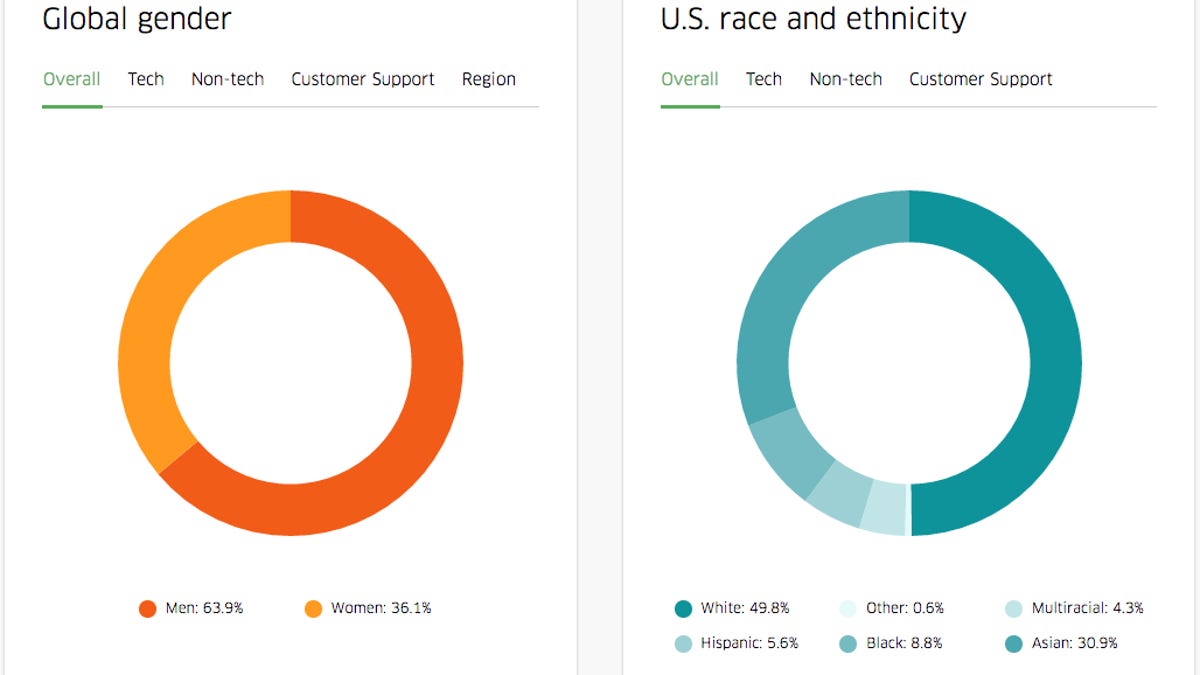Uber's first diversity report reveals no surprises
The ride-hailing company shares its diversity stats for the first time. Guess what? Its employees are mostly white males.
Uber has been under fire for having a male-heavy workforce. Yet, diversity stats on the ride-hailing company's employees show it isn't much different from other tech firms.
Uber released its first diversity report on Tuesday showing that 36 percent of its global employees are women. That number shrinks, however, within tech and leadership roles. Women hold 15 percent of tech and 22 percent of leadership positions at Uber. The numbers at Google, Apple and Facebook are slightly better, but not much.
The report comes on the heels of a difficult past couple of months for Uber, which have involved everything from the resignation of top execs to allegations of sexual harassment to internal leaks detailing a chaotic companywide culture of sexism and unprofessional business practices.
This relentless slew of leaks and revelations have called into question whether Uber can maintain its place at the top of the ride-hailing world, while still having a no-apologies attitude and CEO Travis Kalanick at the helm.
The company has said it wants to change. After former engineer Susan Fowler wrote a blog post in January alleging she and other female employees at the company were sexually harassed, Kalanick apologized and promised to conduct an internal investigation into the matter, supervised by board member Arianna Huffington and former US Attorney General Eric Holder. Kalanick also pledged to release diversity statistics for the first time, after refusing to do so in 2015 and 2016.
"This report is a first step in showing that diversity and inclusion is a priority at Uber," Kalanick said in a statement Tuesday. "I know that we have been too slow in publishing our numbers -- and that the best way to demonstrate our commitment to change is through transparency. And to make progress, it's important we measure what matters."
As far as racial diversity, nearly 50 percent of Uber's US employees are white, almost 31 percent are Asian, 8.8 percent are black and 5.6 percent are Hispanic. Again, these numbers drop for tech and leadership roles. Uber's US tech managers are 75 percent white and 25 percent Asian.
"Our leadership is more homogeneous than the rest of our employees," Uber wrote in its report. "For example, no black or Hispanic employees hold leadership positions in tech. This clearly has to change -- a diversity of backgrounds and experience is important at every level."
Other tech firms aren't much better, however. Google has 22 percent women and 28 percent non-white employees in leadership roles; Apple has 28 percent women and 36 percent non-white employees in leadership roles; and Facebook has 23 percent women and 27 percent non-white employees in leadership positions.
On top of releasing its diversity report, Uber also said it's "dedicating" $3 million over the next three years to "support organizations working to bring more women and underrepresented people into tech." This includes recruiting students from historically black colleges, Uber said.
Still, groups that work on diversity say Uber has a lot more to do, especially given its business is contingent on drivers who come from all types of backgrounds.
"We applaud Uber for finally releasing the diversity data it's held onto for so long, but the company still clearly has a long way to go, given its extremely segregated tech workforce," said Orson Aguilar, president of Oakland's Greenlining Institute. "Uber should strive to have its workforce meet the diversity of its drivers, who are 50 percent people of color."
Solving for XX: The industry seeks to overcome outdated ideas about "women in tech."
Crowd Control: A crowdsourced science fiction novel written by CNET readers.


